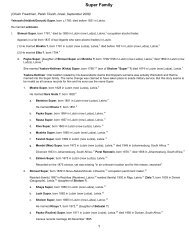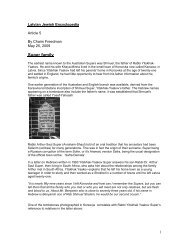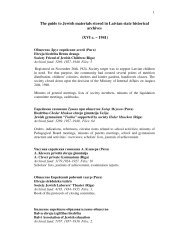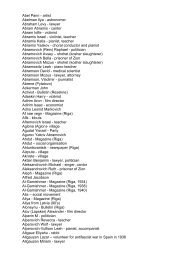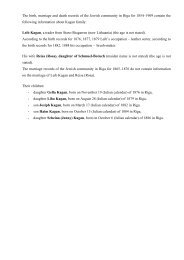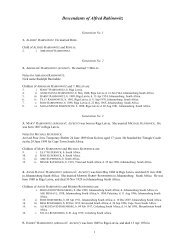- Page 1 and 2:
Max Kaufmann Churbn Lettland The De
- Page 3 and 4:
Contents 5 George Schwab: Foreword
- Page 5 and 6:
George Schwab * Foreword 7 Max Kauf
- Page 7 and 8:
Paul A. Shapiro * Preface to the Fi
- Page 9 and 10:
11 about the Holocaust in Latvia af
- Page 11 and 12:
Gertrude Schneider * Introduction 1
- Page 13 and 14:
15 stood what they had to do. He al
- Page 15 and 16:
17 He saw to it that they met each
- Page 17:
19 Max Kaufmann Churbn Lettland The
- Page 21:
23 Yizkor (Commemoration) The commu
- Page 24 and 25:
Nochum Senitzki * 26 Foreword (Germ
- Page 26 and 27:
28 For the few remaining Jews who s
- Page 28 and 29:
30 mann). The Jews played a large r
- Page 30 and 31:
32 Later on, the revisionist Zionis
- Page 32 and 33:
34 War 1941 - 1945 The Germans Marc
- Page 34 and 35:
36 ready working out the plans for
- Page 36 and 37:
38 the way there, we were beaten ag
- Page 38 and 39:
40 very decent and sympathetic pers
- Page 40 and 41:
42 The following experience also be
- Page 42 and 43:
44 X. Buoyed up by their victories
- Page 44 and 45:
46 XII. A special Bureau of Jewish
- Page 46 and 47:
48 Jēkabpils, Katoļu, Sadovnika i
- Page 48 and 49:
50 thing happened bchipozoin (in ha
- Page 50 and 51:
52 II. As soon as the ghetto was lo
- Page 52 and 53:
54 In one single outpatient clinic,
- Page 54 and 55:
56 where he had hidden his possessi
- Page 56 and 57:
58 Eljaschow, in Sadovnika Street.
- Page 58 and 59:
60 strewn with belongings that had
- Page 60 and 61:
62 Wi dajne kinder plogt man Man ma
- Page 62 and 63:
64 The lawyer Wittenberg had taken
- Page 64 and 65:
66 reported that the guards had tak
- Page 66 and 67:
68 been arrested and then murdered)
- Page 68 and 69:
70 After we had happily settled all
- Page 70 and 71:
72 which was in fact our "host". Th
- Page 72 and 73:
74 still stationed there in order t
- Page 74 and 75:
76 When we went to work in the morn
- Page 76 and 77:
78 The first outside work crews * c
- Page 78 and 79:
80 it with my life!" Now we had to
- Page 80 and 81:
82 The names I noted among them are
- Page 82 and 83:
84 Later it became known that the "
- Page 84 and 85:
86 and Dr. May, also made continual
- Page 86 and 87:
88 German Jews. Our brothers were w
- Page 88 and 89:
90 Feitelsohn (from Bauska), Meilac
- Page 90 and 91:
92 caused a great deal of damage to
- Page 92 and 93:
94 The SS man Migge made himself ve
- Page 94 and 95:
96 The NSDAP work crew included A.
- Page 96 and 97:
98 An eyewitness told me about this
- Page 98 and 99:
100 A large crowd had gathered and
- Page 100 and 101:
102 That evening, when the take had
- Page 102 and 103:
104 Among the people who had been s
- Page 104 and 105:
106 Although the Command Headquarte
- Page 106 and 107:
108 Some of the Jews were also kill
- Page 108 and 109:
110 Germany. Slowly a fire was star
- Page 110 and 111:
112 the detective from Berlin * - w
- Page 112 and 113:
114 longed to "nobody" piled up. Th
- Page 114 and 115:
116 When the work camps were formed
- Page 116 and 117:
118 the police station in Mazā Kal
- Page 118 and 119:
120 later the others also arrived;
- Page 120 and 121:
122 Klempmann Winnik, Ch. Kramer, B
- Page 122 and 123:
124 A small group of Jews had been
- Page 124 and 125:
126 During these final days, our gh
- Page 126 and 127:
128 Part II The "Zentralka" and "Te
- Page 128 and 129:
130 Šķirotava railroad station, b
- Page 130 and 131:
132 also a Russian newspaper founde
- Page 132 and 133:
134 sisting of older people, were a
- Page 134 and 135:
136 The graves were dug deep, very
- Page 136 and 137:
138 (Bombs, bombs fall down) was ve
- Page 138 and 139:
140 letzten Weg" (Don't ever say th
- Page 140 and 141:
142 even tried to convert us to it.
- Page 142 and 143:
144 released from it. Unfortunately
- Page 144 and 145:
146 When everyone came back from wo
- Page 146 and 147:
148 forest, was well-known to all t
- Page 148 and 149:
150 taken to the house at 56 Ludzas
- Page 150 and 151:
152 well-known today in the Soviet
- Page 152 and 153:
154 rabbi Fuchs and the equally pro
- Page 154 and 155:
156 were forced to take off all the
- Page 156 and 157:
158 camp in Riga and the last one i
- Page 158 and 159:
160 others were taken to the Daugav
- Page 160 and 161:
162 Zemgale, Kurzeme and Vidzeme a)
- Page 162 and 163:
164 In the Riga ghetto a certain Zi
- Page 164 and 165:
166 Mass Killing of Libau (Liepaja)
- Page 166 and 167:
168 Part III The "Kaiserwald" Conce
- Page 168 and 169:
170 tions, so their numbers shrank
- Page 170 and 171:
172 IV. The Kaiserwald concentratio
- Page 172 and 173:
174 VI. The transfer of the first J
- Page 174 and 175:
176 Don't think about your clothes
- Page 176 and 177:
178 up of specialists. The first on
- Page 178 and 179:
180 XI. After five o'clock the work
- Page 180 and 181:
182 For this reason, some of them t
- Page 182 and 183:
184 How strongly Jewish religious l
- Page 184 and 185:
186 since there was hardly any room
- Page 186 and 187:
188 thread or something I had manag
- Page 188 and 189:
190 Jews did not regret this death
- Page 190 and 191:
192 The barbers (Zijuni and others)
- Page 192 and 193:
194 There was a lot of talk about h
- Page 194 and 195:
196 he had been a foundling who had
- Page 196 and 197:
198 As soon as one murderer was tra
- Page 198 and 199:
200 Rēzekne). Several other cases
- Page 200 and 201:
202 Even the young people from Viln
- Page 202 and 203:
204 In the meantime the camp repres
- Page 204 and 205:
206 ways had visitors from the HKP
- Page 206 and 207:
208 In Kaiserwald Salaman, Duchowni
- Page 208 and 209:
210 Nor did the others remain in th
- Page 210 and 211:
212 also sewing machines and things
- Page 212 and 213:
214 Bloodsoaked Spilve, which had r
- Page 214 and 215:
216 The drives to Kaiserwald to fet
- Page 216 and 217:
218 strated his power as much as po
- Page 218 and 219:
220 Leibsohn, however, was arrested
- Page 220 and 221:
222 caped from this camp. Because t
- Page 222 and 223: 224 delivered new people, but Dunda
- Page 224 and 225: 226 A large satellite camp with wor
- Page 226 and 227: 228 services were being held in eve
- Page 228 and 229: 230 been finished. Apparently an es
- Page 230 and 231: 232 in Magdeburg, sometimes earned
- Page 232 and 233: 234 lector" - for which one receive
- Page 234 and 235: 236 wooden clubs. They explained to
- Page 236 and 237: 238 Now the call rang out: "Skilled
- Page 238 and 239: 240 cluded people of all nationalit
- Page 240 and 241: 242 walls. Our women were put toget
- Page 242 and 243: 244 us the "high-society table". If
- Page 244 and 245: 246 drove back and forth. I was ass
- Page 246 and 247: 248 Lunch was brought to us once a
- Page 248 and 249: 250 Godes and Schalit. Their health
- Page 250 and 251: 252 bor and the beatings, the infir
- Page 252 and 253: 254 ing: "When the bell rings, the
- Page 254 and 255: 256 ing. The Americans were getting
- Page 256 and 257: 258 quieter, the rest of us gathere
- Page 258 and 259: 260 half-Polish, which reassured th
- Page 260 and 261: 262 as it had come. Less than an ho
- Page 262 and 263: 264 piles of potatoes. Because they
- Page 264 and 265: 266 there were numerous cases of il
- Page 266 and 267: 268 the weak ones were sent to Buch
- Page 268 and 269: 270 The Dachau Concentration Camp (
- Page 270 and 271: 272 Many men and women are in unifo
- Page 274 and 275: 276 Other documents of the same tri
- Page 276 and 277: Index of Names A. Abel, Xavier (Mr.
- Page 278 and 279: Deiberg Delatitzka, Rachel Delatitz
- Page 280 and 281: Grundmann, Josef Grünholz Gruschko
- Page 282 and 283: Kaufert Kaufmann (Berlin) Kaufmann
- Page 284 and 285: Machtus, Eddi Machtus, Herbert Maga
- Page 286 and 287: Presma (Daugavpils) Press, Bernhard
- Page 288 and 289: Schneider, (Makkabi) Schneider, arc
- Page 290 and 291: Wiskind Wisner, Heinz, SS medic Wit
- Page 292: 294 Dawid Budnik/Jakow Kaper, Nicht



